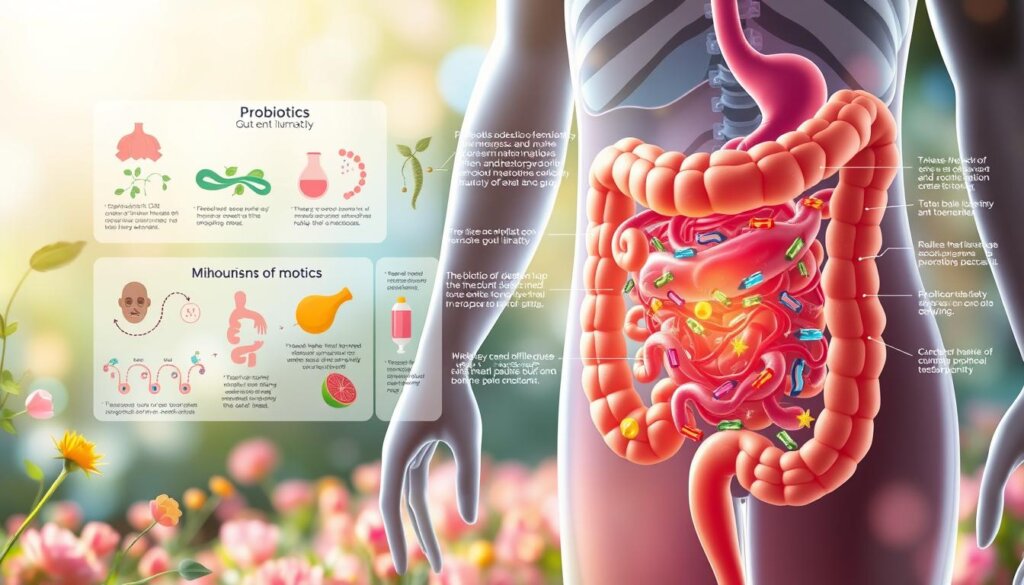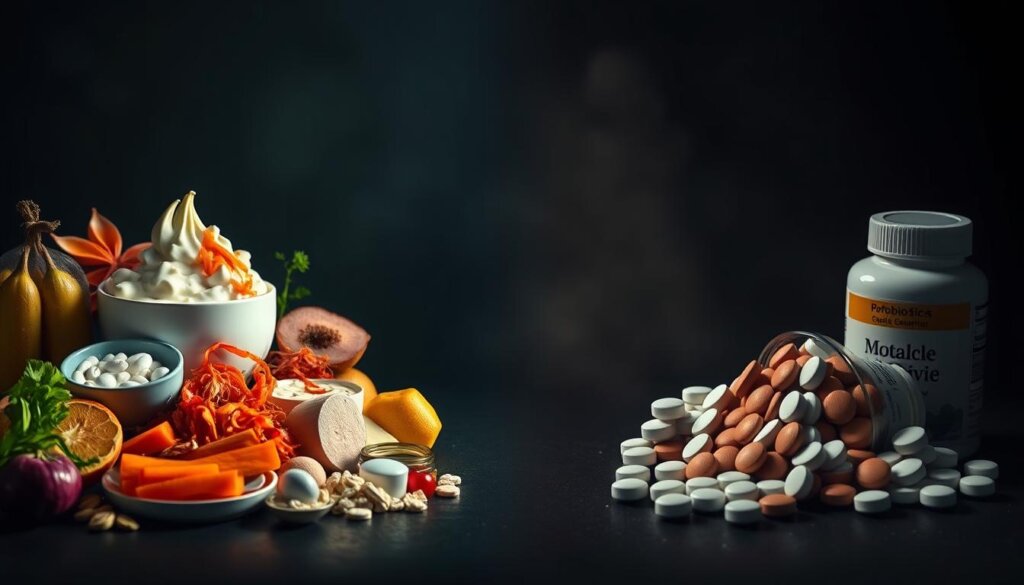What if the solution to chronic constipation isn’t found in your medicine cabinet, but in your gut? Millions worldwide face this frustrating condition daily—16% of adults globally, rising to 33.5% for those over 60. Women are twice as likely to experience it, and 52% of sufferers say it disrupts their lives.
Traditional remedies often fall short, leaving many searching for alternatives. This is where targeted support for gut balance becomes crucial. Wellness Group’s experts have crafted this guide to simplify the science behind digestive wellness, focusing on solutions backed by research.
Discover how specific strains can address discomfort and promote regularity. Learn to navigate the crowded supplement market with confidence, using criteria like strain specificity and clinical evidence. Whether you’re new to gut health or seeking better results, this resource offers actionable insights.
Key Takeaways
- Over 1 in 6 adults experience persistent digestive discomfort globally
- Traditional approaches leave 52% of users unsatisfied with outcomes
- Science-backed microbial support could offer personalized solutions
- Wellness Group provides free consultations at +60123822655 for guidance
- Strain selection matters more than general probiotic labels
Wellness Group combines cutting-edge research with practical advice to help you make informed choices. Their team remains available weekdays to discuss personalized strategies for digestive health.
Understanding Constipation and Its Impact
Recognizing the signs of an unhappy gut is the first step toward finding relief. While many focus solely on bathroom frequency, true digestive wellness involves multiple factors. Discomfort often stems from various triggers that disrupt natural rhythms.
Recognizing Symptoms and Causes
Common signs extend beyond infrequent bathroom visits. People might experience hard, lumpy stool or strain during elimination. Some feel persistent abdominal discomfort or the nagging sense of incomplete relief.
Daily habits play a significant role. Diets lacking fiber, inadequate water intake, and prolonged sitting contribute to sluggish digestion. Certain medications like iron supplements or painkillers can also trigger issues.
Underlying health conditions shouldn’t be overlooked. Thyroid imbalances, neurological disorders, and pregnancy often affect bowel regularity. Stress levels and physical activity directly influence gut function too.
Impact on Daily Quality of Life
Persistent digestive troubles can drain energy and focus. Many report avoiding social events or struggling through workdays due to discomfort. This cycle often leads to frustration and decreased well-being.
Understanding personal triggers helps break this pattern. Whether it’s adjusting meal plans, increasing movement, or exploring targeted support, tailored approaches yield better results. Early recognition of symptoms prevents long-term complications.
How Probiotics Work for Constipation Relief
Imagine tiny workers in your digestive system producing natural compounds that keep things moving smoothly. These beneficial microorganisms act like internal trainers, teaching your body to maintain its rhythm without harsh interventions.

Three Natural Processes for Better Digestion
These friendly helpers create short-chain fatty acids (SCFAs) when breaking down fiber. These acids energize intestinal muscles, encouraging efficient food movement. Think of them as gentle reminders for your digestive tract to stay active.
They also produce lactic acid, making the colon slightly more acidic. This pH change acts like a natural alarm clock for your bowels. It stimulates muscle contractions while creating an environment where harmful bacteria struggle to thrive.
| Mechanism | Action | Effect |
|---|---|---|
| SCFA Production | Stimulates intestinal muscles | Improved motility |
| pH Reduction | Activates colon contractions | Softer stool consistency |
| Bile Processing | Enhances fat digestion | Regular elimination patterns |
What Science Tells Us
Recent clinical studies reveal specific strains can increase weekly bathroom visits by 1.5 times. Researchers found these microorganisms help restore balance in 78% of participants with irregular digestion within 8 weeks.
Unlike temporary fixes, these solutions address the root issue – bacterial imbalance. By crowding out harmful strains and reinforcing protective barriers, they create lasting improvements. This approach supports the body’s innate processes rather than overriding them.
Most Effective Probiotics for Constipation Relief
Research reveals specific microbial allies can make measurable differences in digestive function. Let’s explore four clinically validated options that show particular promise for improving regularity.
Powerful Microbial Allies for Gut Health
Bifidobacterium lactis BB-12® stands out in large-scale trials. A study with 1,000 participants showed it boosted weekly bathroom visits from 3 to 4. This strain appears particularly effective at supporting consistent elimination patterns.
Another notable performer, Bifidobacterium lactis HN019, demonstrated dramatic improvements in digestive speed. Test subjects experienced reduced gut transit time from 49 hours to just 21 – essentially cutting digestion duration by half.
- DN-173 010 strain: Reduced colon transit time by 20% in healthy adults
- IBS-specific benefits: 12-hour faster transit in constipation-predominant cases
While Lactobacillus rhamnosus GG® shows potential, studies suggest it works best alongside other strains. This highlights the importance of combination formulas for comprehensive support.
Recent clinical research confirms strain specificity matters more than general product claims. Choosing supplements containing these validated microorganisms increases the likelihood of noticeable improvements in digestive rhythm and comfort.
Probiotics vs. Conventional Treatments for Constipation
Many people reach for quick fixes when digestive troubles strike, but what if there’s a smarter way to support your system long-term? Nearly half of those with chronic bowel issues report frustration with standard approaches like laxatives and fiber supplements. These methods often address symptoms temporarily without resolving underlying imbalances.

Gentle Solutions vs. Temporary Fixes
Traditional treatments frequently create a cycle of dependency. Stimulant laxatives, while effective short-term, can weaken natural bowel function over time. Users often experience cramping or sudden urgency – side effects that disrupt daily life.
In contrast, targeted microbial supplements work with the body’s rhythms. They strengthen gut muscle activity and improve stool consistency through natural processes. One study found 68% of participants preferred this approach to conventional options after 12 weeks of use.
Fiber supplements may also provide relief, but they don’t address microbial imbalances. When combined with specific strains, these two approaches create synergistic effects. This partnership helps maintain regularity without shocking the digestive system.
“The best results come from supporting the body rather than forcing it,” notes a gastroenterology researcher. Probiotic formulas help restore the gut’s self-regulating abilities, reducing reliance on external interventions. Most users report fewer digestive emergencies and more predictable patterns.
Safety remains a key advantage. While laxatives carry risks like electrolyte imbalance, microbial therapies typically cause minimal discomfort. This makes them suitable for extended use in managing chronic digestive concerns.
Selecting the Right Probiotic Supplement
Navigating the supplement aisle can feel overwhelming with endless options. Smart choices begin with understanding what truly matters for digestive support. Quality trumps quantity when seeking lasting results.
Key Considerations for Buyers
Colony Forming Units (CFU) count gets attention, but research shows 10-20 billion CFUs often work better than ultra-high doses. Look for products containing strains like Bifidobacterium lactis HN019 or BB-12® specifically studied for bowel regularity.
Third-party verification separates reliable options from questionable ones. These certifications ensure what’s on the label matches what’s inside:
| Certification | What It Checks |
|---|---|
| NSF International | Ingredient accuracy |
| USP Verified | Manufacturing standards |
| ConsumerLab | Potency through expiration |
Dosage and Timing Strategies
Morning routines matter. Taking supplements 30 minutes before breakfast helps beneficial strains survive stomach acid. Most people see improvements within 3-6 weeks, though individual responses vary.
Fermented foods like kimchi offer natural microbial support, but their strains rarely target specific digestive issues. For persistent concerns, targeted formulas provide more consistent results.
While generally safe, those with immune concerns should consult healthcare providers. Start with lower doses and gradually increase to allow your system to adjust comfortably.
The Role of the Gut Microbiome in Constipation Relief
Your digestive tract houses a thriving ecosystem – trillions of microorganisms working in sync. This complex community influences everything from nutrient absorption to immune responses. When balanced, it supports smooth digestion and regular bowel movements.
Understanding Dysbiosis and Its Effects
An imbalance in this bacterial community, called dysbiosis, frequently occurs in those with irregular digestion. Studies show people experiencing constipation often have fewer beneficial strains like Bifidobacteria in their gut. Harmful bacteria may outcompete them, disrupting the entire digestive process.
Common habits disrupt this delicate balance. Diets high in processed foods, chronic stress, and antibiotic use can reduce helpful bacteria. Even moderate dehydration or inconsistent sleep patterns may weaken gut defenses.
Research suggests these imbalances slow intestinal transit time by altering moisture levels in the colon. The result? Hard, difficult-to-pass stool that characterizes many constipation cases.
Targeted supplementation introduces specific strains shown to restore microbial harmony. These beneficial bacteria compete with harmful ones for resources while producing compounds that soften stool. Over time, this creates conditions for consistent bowel function.
Supporting microbial balance doesn’t just address constipation – it strengthens the gut lining and enhances nutrient absorption. Many users report improved energy levels and fewer digestive complaints overall.
Wellness Group: Personalized Advice & Business Information
Finding lasting digestive comfort requires more than generic solutions. Wellness Group specializes in tailored approaches for those struggling with irregular bowel patterns or age-related digestive changes. Their team recognizes that gut health needs differ across lifestyles and life stages.
Contact Details and Consultation Options
Connect with digestive health experts via WhatsApp at +60123822655 for free consultations. The team helps people identify root causes rather than offering one-size-fits-all answers. Whether managing irritable bowel syndrome or occasional discomfort, they create strategies matching individual health goals.
Business Hours and Availability
Wellness Group maintains flexible hours to serve busy schedules:
- Weekdays: 9:30 AM – 6:30 PM
- Saturday: 10 AM – 5 PM
- Sunday: Closed
Their nutritional specialists combine research with practical advice, helping people navigate probiotic options safely. Over 60% of clients report improved regularity within six weeks of personalized guidance.
FAQ
What are the common signs of constipation?
Bloating, infrequent bowel movements, and hard or lumpy stools often signal constipation. Some people also experience straining or a feeling of incomplete evacuation.
How do probiotics improve stool consistency?
Probiotics like Bifidobacterium lactis produce short-chain fatty acids (SCFAs), which soften stools by increasing water retention in the colon. They also balance gut pH levels to support smoother digestion.
Are probiotics safer than laxatives for long-term use?
Research suggests probiotics may offer a gentler, sustainable option compared to stimulant laxatives, which can cause dependency. However, consulting a healthcare provider is advised for chronic cases.
Which probiotic strains are best for irritable bowel syndrome (IBS)?
Strains like Lactobacillus plantarum and Bifidobacterium infantis show promise in easing IBS symptoms, including irregular bowel movements and abdominal discomfort, based on clinical trials.
Can diet alone provide enough probiotics for constipation relief?
Fermented foods like yogurt, kefir, and sauerkraut contain natural probiotics, but supplements with targeted strains often deliver higher, more consistent doses for noticeable relief.
How long does it take for probiotics to work?
Many people notice improvements in 2–4 weeks, though results vary. Consistency is key, as gut microbiome changes require time to influence digestion and stool frequency.
What should I look for in a probiotic supplement?
Choose products with clinically studied strains, clear CFU counts (e.g., 10–20 billion), and third-party testing. Avoid additives if sensitivities are a concern.
Does gut dysbiosis worsen constipation symptoms?
Yes. An imbalance in gut bacteria can slow digestion, reduce SCFA production, and lead to harder stools. Probiotics help restore microbial balance to ease these effects.
How can I contact Wellness Group for personalized advice?
Visit their website or call during business hours (9 AM–5 PM EST, weekdays). They offer free consultations to discuss tailored solutions for digestive health.






